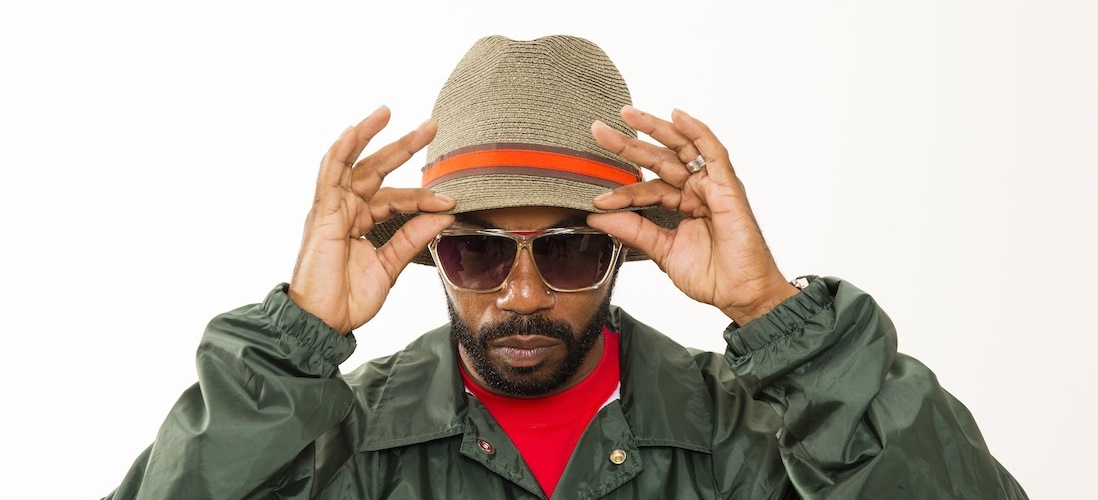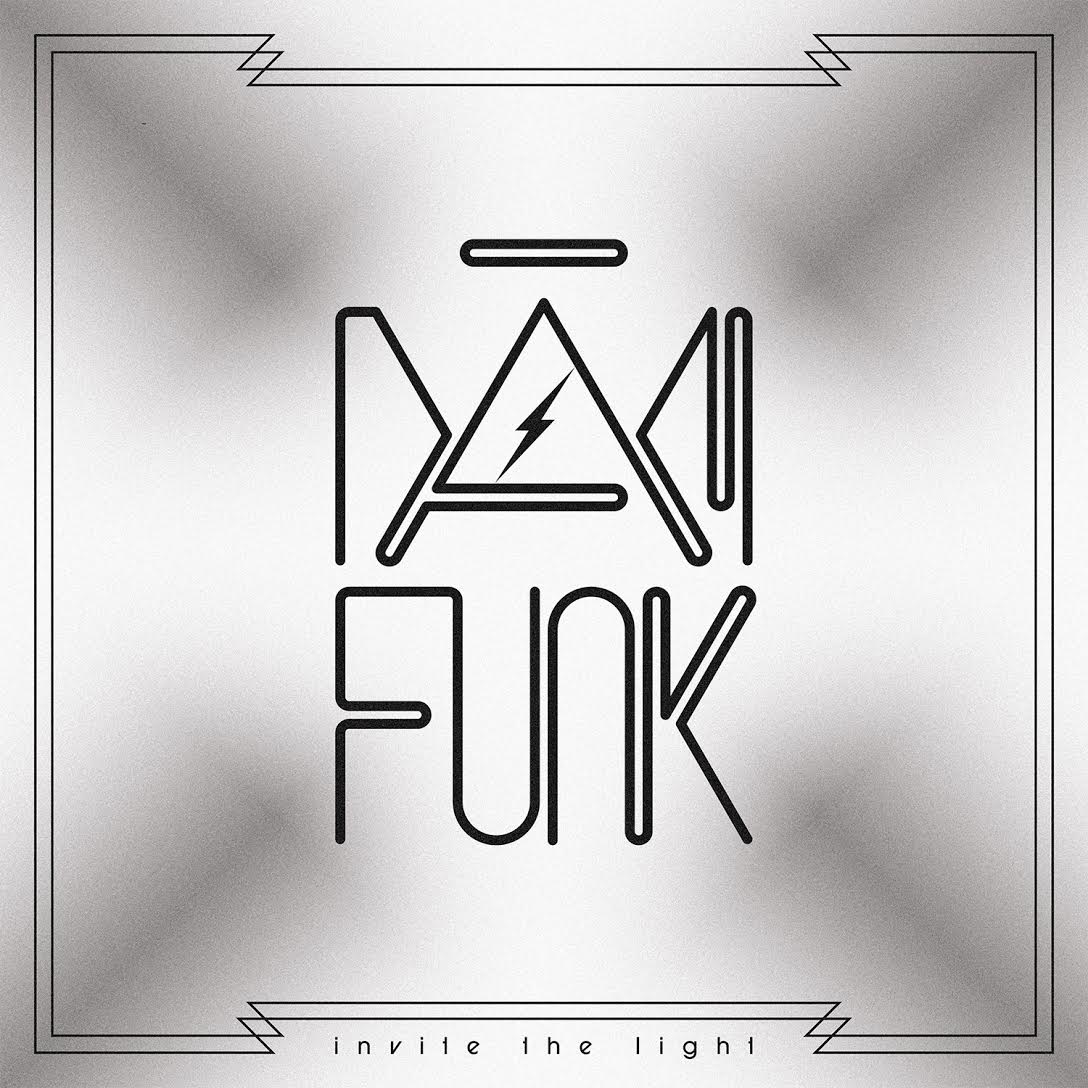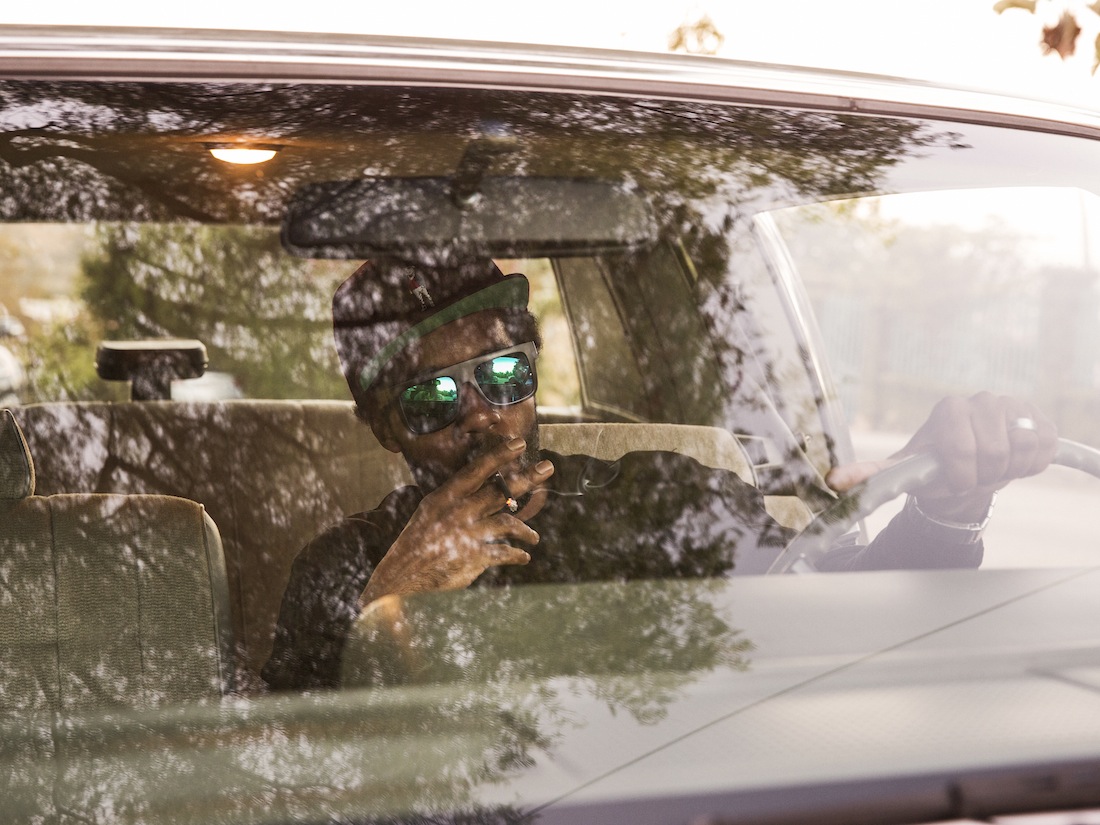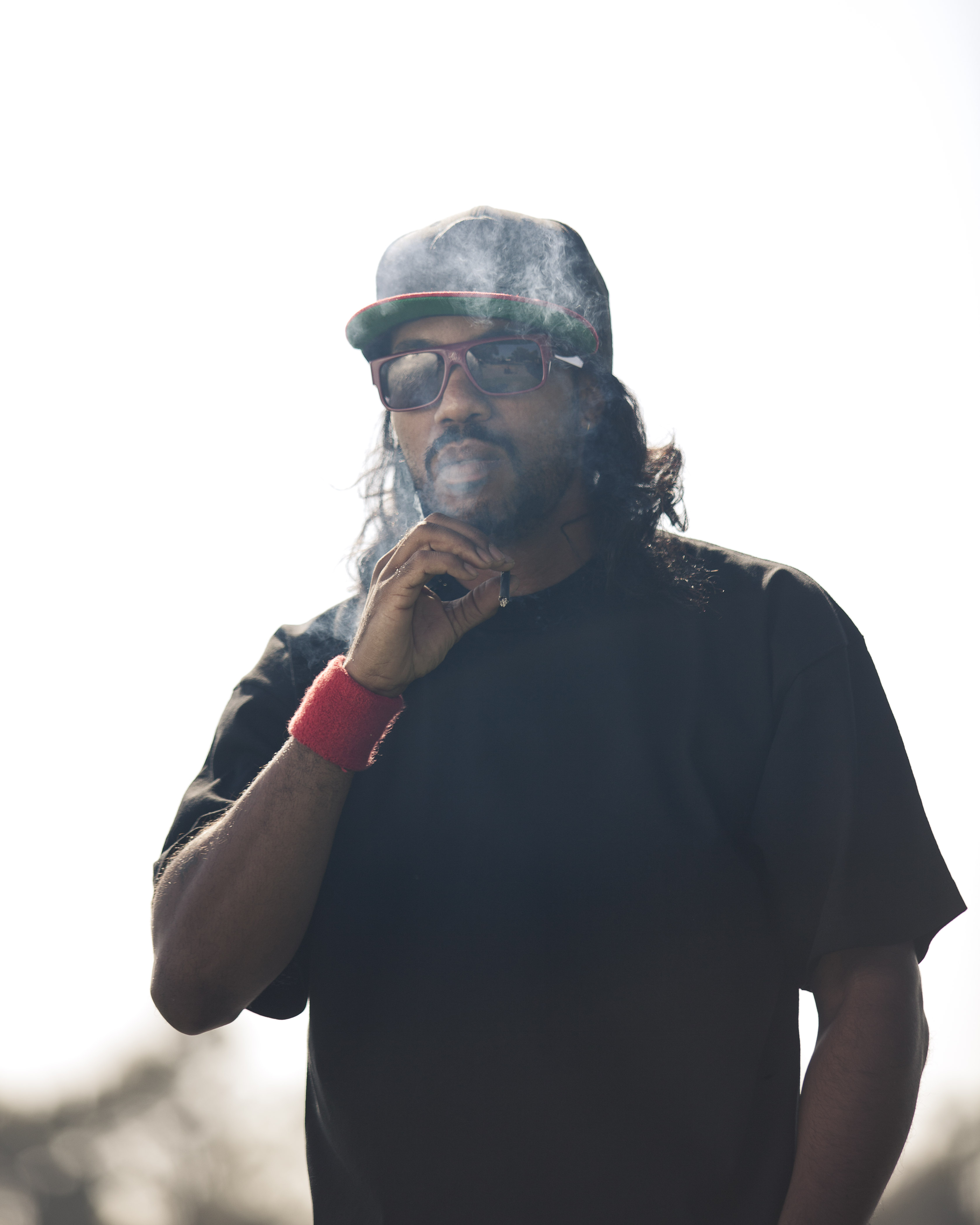Q&A: Dâm-Funk
With a new album on Stones Throw, the LA funk maven talks influences, recognition and Snoop Dogg.

Q&A: Dâm-Funk
With a new album on Stones Throw, the LA funk maven talks influences, recognition and Snoop Dogg.

The spoken-word intro that leads off Invite the Light, the latest full-length missive from Dâm-Funk, comes with a proclamation: “If we invite the light, it will surely come to us,” a processed, distorted voice informs us; “if we invite the funk, it will never let us down.” The words themselves tell of the pure positivity that funk holds for the man born Damon Riddick—but its the source of that voice that truly shows how serious a matter funk is for the LA producer. It belongs to Junie Morrison, the near-legendary producer, musician and songwriter of the Ohio Players, who later served as the music director of George Clinton‘s P-Funk ensemble.
It’s a sign, one of many embedded in Invite the Light, that funk is more than just another rhythmic option for Riddick. The album, released on Stones Throw, references the likes of Prince, Parliament-Funkadelic, Jam & Lewis, the Zapp Band, Brass Construction and countless funk and and R&B artists from days gone by, but it doesn’t exactly copy any of them—this is funk filtered through Riddick’s slightly skewed vision, one that puts a unique stamp on the genre while still paying homage to what’s come before. It’s also an incredibly heartfelt album, forgoing the depressingly-common tendency to treat funk as a period piece—or worse, to treat it as a prop of sorts, something to use as an aural punchline to a stale joke. Instead, he’s fully internalized the funk: It’s a part of his ethos and his life, something that infuses everything about him—especially his music.

Invite the Light—a 20-track, 80-minute, years-in-the-making groove machine—is something of an all-star funk affair. Besides Morrison, the album features contributions from Leon Sylvers III, the in-house producer for the vastly influential SOLAR label who also served time as a member of family funk combo the Sylvers (“Hot Line,” “Boogie Fever,” et.al.); his son, Leon Sylver IV, also appears. There are hip-hop icons Snoop Dogg, who worked with Riddick on 2013’s 7 Days of Funk LP, and Q-Tip of A Tribe Called Quest; R&B chanteuse Jody Watley and rapper Kid Sister; and a slew of slightly more left-field guest spots, from the likes of Flea, Ariel Pink, Computer Jay, Novena Carmel (Sly Stone’s daughter, among other claims to fame) and Nite Jewel. Riddick is currently in the midst of a tour that’s taking him from Denver to Tokyo (with stops throughout Europe and the Middle East in between), but he had enough time to stop and chat with XLR8R at Brooklyn’s Wythe Hotel.
Can you explain the significance of the album’s title, Invite the Light?
It’s based on inviting good energy—positive energy—into your life. We all go through a lot of things in life, ups and downs and peaks and valleys. But in the end, if you invite the light inside of your mind, body and soul, you’ll be okay.
The album kicks off with a funk manifesto of sorts, voiced by Junie Morrison.
Yeah, he came up with all that. I had invited him to be on the record, and he was like, “I got something for you, man.” Of course, I said, “Cool, send it over.” And it just fit so perfectly. He actually did another song, with this great solo that we didn’t put on the album. I’m gonna save that for a b-side. He’s shredding.
He’s one of the all-time kings of funk.
Definitely. People don’t even know that this guy is still destroying it, but he has this underground monk status with the people who do know. Just to have him on the record is such an honor, and I thought it would be something for the funk purists. Maybe if they see that Junie Morrison is aboard, they’ll be like, “Oh, this Dâm-Funk dude is real,” and its not just some funk fan-boy type situation—that there’s some real shit going on.
Well, you’ve been living the funk life yourself for quite a while. You basically grew up with this music, right?
Yeah, that’s true, and this really is my life.
“To me, funk is like a smile with a tear—and that’s the kind of funk that I make.”
It seems like that throughout your career, you’ve been moving closer and closer towards what your own vision of funk is.
That sounds right. I mean, I respect all the funk that came before me—but for a while, it almost got sort of comedy-based, like “shake your booty” type stuff all the time. And there’s so much more to funk. Funk is sadness, it’s happiness, and it’s everything in between. It’s not just a party. What I was trying to do with this record, and with my career so far, is to bring in all these different moods, and not just have it be a “get on the good foot” vibe. To me, funk is like a smile with a tear—and that’s the kind of funk that I make.
When you think of the great funk songwriters and performers, they do manage to combine all the emotions, from ecstasy to pathos.
Definitely, and the main thing that’s disappointed me in the past few years in regards to funk are things like the Dave Chappelle skits—“I’m Rick James, bitch.” I mean, that was cool—and I love Dave—but that kind of mockery tends to lessen the respect for funk. “Cocaine’s a hell of a drug”…eh, that’s not quite really what funk is. I’m just trying to give a facelift to the visuals and the sound of funk, and continue the tradition more progressive-type funk. Mtume, Change, Loose Ends…the kind of stuff before hip-hop kind of took over what people’s ideas of funk was, and before the labels started releasing only that one expression of funk, that one black expression of art. Other than jazz—and that got watered down, too! Anyway, I’m trying to make sure that people of all backgrounds and races know that funk is still alive, and you can still experiment with it and do new things with it. That’s why I came up with the term “modern funk” to describe what I do.

In past interviews, you’ve cited Funkadelic’s “(Not Just) Knee Deep” as one of your formative songs. Are there any others that really stood out for you?
Well, there’s Prince’s whole catalog. [laughs] The 1999 album is what made me start doing my own music. Slave’s “Just a Touch of Love”; Change’s “Paradise”; Mtume’s “Prime Time”; Loose Ends’ “Gonna Make You Mine”—that kind of stuff. These aren’t necessarily well-known songs, but they really resonated with me and helped me develop my sound.
You can definitely hear a bit of Mtume in that song with the Sylvers, “Glyde 2nyte.”
Yeah, for sure. That’s exactly the vibe I was trying to create—that kind of two-step vibe that would get Chicago cats doing that couples-dance thing. And you can just glide to it.
Hence the name.
Exactly. The spelling’s a little weird, of course. [laughs] I have to tell you, Leon is just incredible.
Leon Sylvers III’s been something of a mentor to you, hasn’t he?
He took me under his wing right when I got out of high school, talking to me about the business and everything he went through. A lot of people don’t realize that SOLAR was the precursor to Death Row Records. SOLAR was Dick Griffey and Leon Sylvers; then it was Suge Knight and Doctor Dre. It was all out of the same building and everything. Anyway, Leon told me the kinds of things I should watch out for—and a lot of studio techniques, too. Of course, I wasn’t in a big studio like he was, but I would take the things I would learn from him and take them to my bedroom studio. That’s how the bedroom recording and the big-production thing meshed for me. After that, I just kind of struck out on my own. Instead of going apeshit over sports, I really delved into music and started working with a lot of West Coast G-Funk kinds of things.
Speaking of G-Funk…you’ve worked with Snoop before, and he appears on the new album. How is he to work with?
Oh, man, he’s a great guy. I wouldn’t bullshit you—he’s really cool and laid-back. And he’s very smart, but he makes himself relatable, so you don’t even always notice what a smart guy he is. He’s got a really positive energy. We have a lot of respect for each other. When he came over to my house to do “Hit Da Pavement,” the first song from 7 Days of Funk, he just pulled up to my house with his cousin, and we were just jammin’ in my bedroom. He just put the microphone up to his mouth and just did it. He’s so down to earth, and he abides by the G code. He’s just a good guy.
I’ve heard you DJ, and I get the feeling that you’re definition of funk is a pretty wide-open one.
Yeah, cats like Larry Heard and Theo Parrish will always be in the mix. Larry Heard…he is just so good! I’m into a lot of styles, really—that’s why my music sounds the way it does, and isn’t just straight slap-funk. I try to mix in beautiful chords, interesting drum machines, and all kinds of stuff.
That range shows in your choice of guests on the new album. Somewhere between the Q-Tip and Snoop cuts, you have a song with Ariel Pink, for instance.
Ariel Pink is one of my favorite new artists—really. And there’s Nite Jewel, and Computer Jay, too. These are all people I know. I operate on a pretty organic vibe. Like Q-Tip…I just know him from seeing him backstage, saying, “Hey, what’s up man.” I had this song called “I’m Just Tryna Survive (In the Big City),” and I thought of him—and I had his number, so I just hit him up. I sent him the music—and he sent it back the very next day.
“I’m comfortable with what I have—being able to make music, getting it to people with like minds, and having that music become part of their lives.”
Wow.
Yeah, that’s what I said. Sometimes I wonder if people are paying attention to me, or even know who I am. But when things like that happen, it shows me that I must be doing something right.
I don’t think you have to worry about that; there seems to be a lot of respect for you among your peers.

I’ve based my career on trying to keep my integrity and not selling out. And for someone like Q-Tip to do something that fast and that good for me, it does show that the respect is there. I guess it’s like with Larry Heard—some of us know and respect this guy, but he might never know, because there’s no easy way for me or you to express it to him. So I just have to sit and believe that there are people out there, even though I’m walking around wondering if people even know who I am. But once in a while, I’m reminded that people know my music, and that the most important thing. That’s what makes me happy. I’m comfortable with what I have—being able to make music, getting it to people with like minds, and having that music become part of their lives.
Dâm-Funk’s Invite the Light is available now through Stones Throw Records.

